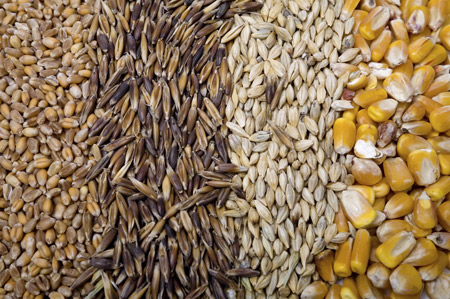 (Businessweek) – India, the world’s second-biggest producer of wheat, may fail to boost export from state stockpiles to make room for a near-record harvest after the government set a price higher than other global shippers.
(Businessweek) – India, the world’s second-biggest producer of wheat, may fail to boost export from state stockpiles to make room for a near-record harvest after the government set a price higher than other global shippers.
Wheat from state inventories is 15 percent more expensive than U.S. supplies on a free-on-board basis and at least 24 percent costlier than Russian and Ukrainian grain, according to Tejinder Narang, an adviser with Emmsons International Ltd. (EMSI), a New Delhi-based trader. The government will need to lower prices to boost exports, he said.
Futures slumped to the lowest level since June in Chicago on April 1 on signs that expanding supplies will outpace demand amid concern that global growth will falter. Falling prices may hamper India’s plan to increase exports amid forecasts for a near-record harvest, while further cooling global food prices, which fell for a fifth month in February.
“If prices remain low in the international market India will be required to lower its prices as the country in any case needs to liquidate its stocks,” said Ramesh Chand, director of the New Delhi-based National Centre for Agricultural Economics and Policy Research. “Global prices are declining and because of that it will be difficult to achieve the export target.”
Shipments in the year that began on April 1 may be less than the 10 million metric tons estimated in January because of falling global prices, Chand said.
Transportation Cost
India’s cabinet on March 7 approved exports of 5 million tons of wheat by private traders from state stockpiles at a minimum price of 14,800 rupees ($271.6) a ton. Traders will need to buy the grain from the 2011-2012 harvest stored in warehouses in Punjab state and will need to bear the cost of transportation to the ports, according to Food Minister K.V. Thomas.
Wheat at Indian ports may cost about $322 a ton, compared with $250 a ton to $260 a ton for supplies from Russia and Ukraine for delivery in July and August, Emmsons’ Narang said.
“The government will need to review the prices and the entire export policy if they want liquidation of stocks,”Narang said by phone. “There is no parity for this kind of price in the international market.”
Bear Market
Wheat entered a bear market in January as prospects for crops improved and speculation increased that last year’s price gain would prompt farmers to plant more. The contract for May delivery rose 1.3 percent to $6.795 a bushel in Chicago at 4:58 p.m. in Mumbai. Futures tumbled to $6.5975 on April 1, the lowest for a most-active contract since June 20. Prices have fallen 28 percent from the last year’s closing peak of $9.4325 a bushel on July 20.
The global wheat harvest may climb 4.3 percent to 690 million tons this year, the United Nations’ Food & Agriculture Organization said last month in a report, as European farmers expanded acreage while yields rebounded in Russia.
India’s wheat production may total 92.3 million tons in the year ending June, near the record 94.9 million tons a year earlier, according to the farm ministry. State stockpiles expanded 27 percent to 27.1 million tons at the start of last month. The government plans to boost purchases from farmers to 44 million tons in the marketing year that began April 1 from 38.1 million a year earlier, the food ministry said Feb. 19.
“The new crop arrival and a slowdown in exports are pushing down local prices,” said Kishore Narne, head of commodity and currency at Motilal Oswal Commodity Broker Pvt.“The government will probably cut prices to bolster exports.”
The contract for April delivery on the National Commodity & Derivatives Exchange Ltd. fell as much as 0.6 percent to 1,380 rupees per 100 kilograms and was last at 1,392 rupees in Mumbai.
Exports from state reserves by private traders are in addition to 4.5 million tons already approved for shipment by government-run companies since July. Total sales were 4.03 million tons between April 1, 2012 and Feb. 22, according to the food ministry.




